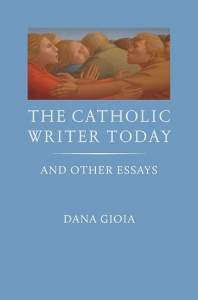Literary Witness: A Review by Chris Byrd
 The Catholic Writer Today
The Catholic Writer Today
By Dana Gioia
Wiseblood Books, 2019
$18.00 216 pp.
Variance in tone makes it difficult to evaluate Dana Gioia’s new book The Catholic Writer Today. By turns angrily provocative and accessibly erudite, this collection of essays and interviews reflects upon the bearing of religious faith on writers’ work.
Gioia, a former chairman of the National Endowment for the Arts, is best known for his poetry. His volume Interrogations at Noon won the American Book Award in 2001. But it may surprise some to discover that he is also an accomplished librettist.
In the title essay, which originally appeared in the religiously conservative intellectual journal First Things in December 2013, Gioia concedes: “By now I have surely said something to depress, anger, or offend every reader of this essay.” That’s a forthright self-assessment of a far-reaching argument, which begins with this jarring if dubious proposition: “Catholicism currently enjoys almost no positive presence in the American fine arts—not in literature, music, sculpture, and painting.”
Gioia concentrates upon “imaginative literature—fiction, poetry, drama, and memoir,” and to buttress his case, he divides Catholic writers into categories: active and practicing; cultural ones, who were raised in the faith but “gradually drifted away”; and those who have left the church but “remain obsessed with its failings and injustices.”
By these rigid standards, the author identifies two well-known practicing Catholic novelists—the multiple National Book Award–winning Alice McDermott and the Jesuit-trained Ron Hansen—as being among a handful of practicing Catholic writers who significantly influence contemporary literature. Gioia’s categories, however, appear self-serving and are occasionally erroneous. For instance, he refers to the wonderful short story writer, the late Andre Dubus (d. 1999), as a “cultural” Catholic. This doesn’t fairly describe the man, who once said of the Eucharist: “Since I was a boy, this sacrament has sustained my belief in God.”
More than misguided or misinformed, the author’s supercilious judgments gratuitously and arbitrarily eliminate writers who aren’t Catholic enough. Eschewing his fixation with who practices their faith and who doesn’t, Gioia could have produced a much more extensive list of leading Catholic writers. The novelists William Kennedy and Louise Erdrich, the former Poet Laureate Billy Collins, and the recently deceased poet Marie Ponsot (d. 2019) should all be on that list. Devotees of the late and underappreciated fantasy writer Gene Wolfe (d. 2019) will insist he be included. The former Tennessee altar boy, novelist Cormac McCarthy—arguably his generation’s greatest writer—should head it.
Catholic literature is in better shape than Gioia presumes it to be, and his laments about perceived anti-Catholicism only adds to the reader’s feeling the author is a hyperbolic crank. When that persona largely recedes, however, in the essays and interviews that follow, readers will be agreeably surprised.
Gioia’s essays about other writers and their faith distinguish The Catholic Writer Today. Combining capsule biographies and literary criticism, these pieces are especially memorable when the writer attempts to rescue more obscure authors. Elizabeth Jennings’s (d. 2001) tragic case is a good illustration. Gioia calls the mid-20th-century writer “England’s best Catholic poet since Gerard Manley Hopkins.”
Jennings’s first collection, A Way of Looking, won the Somerset Maugham Prize in 1955. After being required to travel aboard by the prize committee, the poet lived in Rome for three months in 1957. Her time there, Gioia writes, “revitalized her Catholic faith.” Jennings later declared that “my Roman Catholic religion and my poems are most important things in my life.”
His description of Jennings’s troubled life showcases Gioia’s richly evocative style. “She was hospitalized for mental illness. By forty, she had sunk into poverty. . . . Alone and destitute in old age, Jennings moved from one short-term lodging to another, a shabby eccentric haunting Oxford cafes.”
Despite these hardships, Jennings managed to produce more than 1,300 poems in her lifetime. The best of these, Gioia writes, “are vivid representations of Gospel episodes—‘The Annunciation,’ ‘The Visitation,’ and ‘Lazarus.’” However, Gioia believes “her reputation would be larger if she published less.”
Readers will feel indebted to Gioia for the introduction to writers they might not have discovered otherwise, including Jennings and other lesser-known Catholic poets such as Dunstan Thompson and William Everson. These essays likely will win back readers Gioia may have alienated earlier. But because these pieces generally reflect contemporary Catholic literature’s outstanding quality, readers may still wonder what got the author of The Catholic Writer Today so worked up in the first place.
Chris Byrd writes from Washington, D.C. His work has appeared in America, Sojourners, and the National Catholic Reporter.




Leave a Reply
Want to join the discussion?Feel free to contribute!